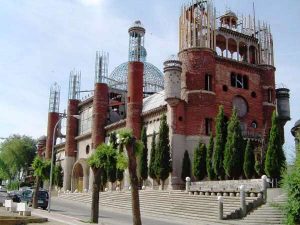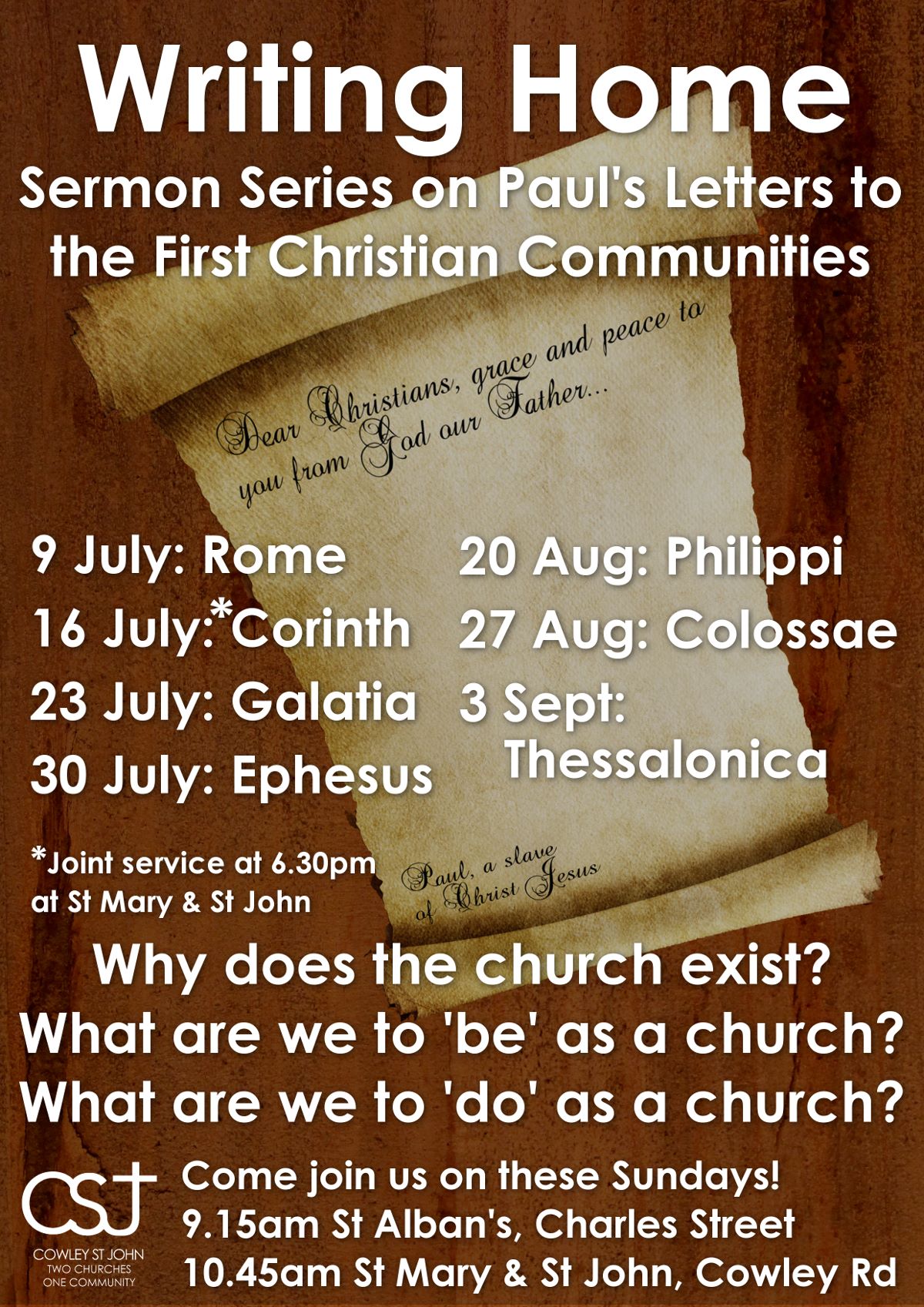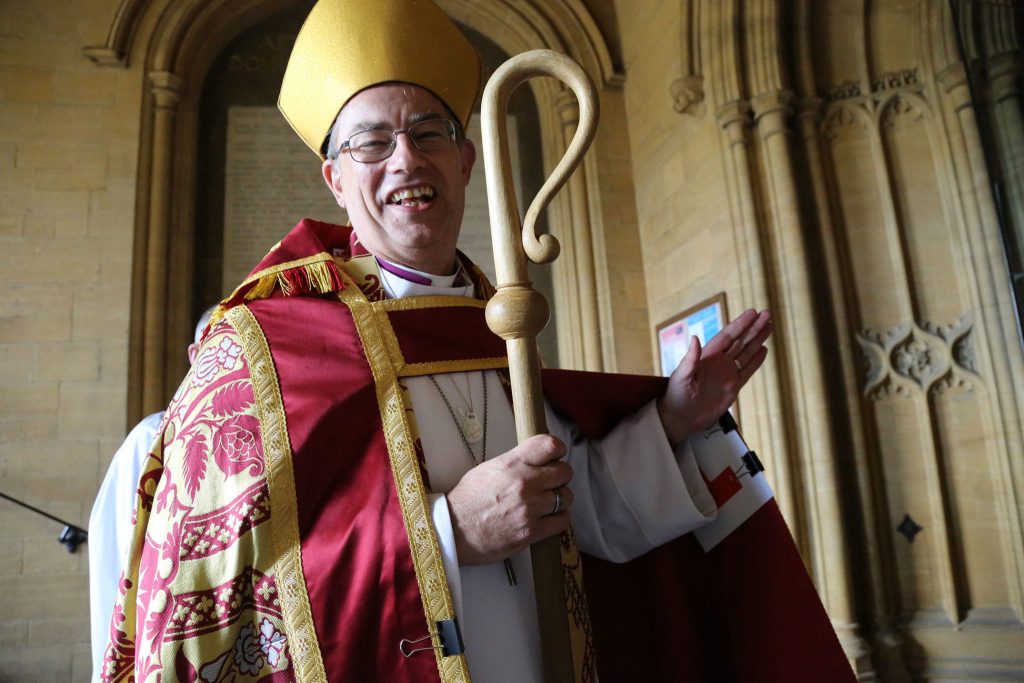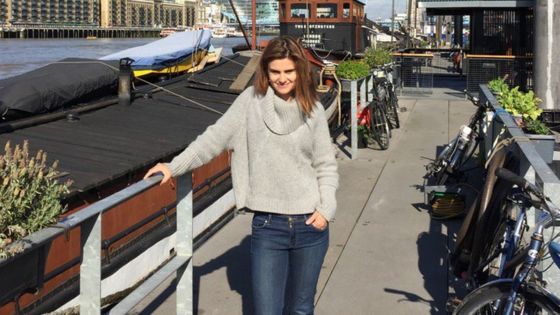Sermon preached by Petronella Spivey, one of our Licensed Lay Ministers, on Galatians 5.13-6.2. It is the third of a sermon series reflecting on the nature and purpose of the Church through St Paul’s letters to the first Christian communities.
One of the very few bible verses I know by heart is in this reading. It must appeal to my love of lists, because, aided by a dreadful tune that I have been unable to find music for (so you are spared that), I can recite all nine gifts of the spirit for you.
Not that I can actually demonstrate them very well in real life, which is maybe part of the point of Paul’s letter.
But being able to remember them in a list gave me an interesting exercise on a recent nine day break — namely to take one gift for each day, and look for opportunities to practice it, spot it in others, and notice its absence in myself.
But that’s not really quite I wanted to talk about.
Phil’s 3 Questions and Paul’s First Answer
Father Phil has been challenging us to discover for ourselves, as individuals, and as a community, the answer to three questions.
Why does the church exist?
What is the church to be?
What is the church to do?
Is there anything new in this letter to the Galatians to help us with our investigations?. Phil has shown us how Paul’s letter to the Romans, encourages to live alongside people we don’t like: and Bishop Steven has found in the letters to the Church in Corinth, an encouragement to nurture and teach new believers. Is there anything new in this letter to the Galatians to help us with our investigations?. Here is a group of churches founded by Paul, living ,as the church in Rome did in a multi-cultural community; wrestling like others, with the tensions between believers of a Jewish heritage, and believers with other backgrounds. What then does Paul’s letter to the churches (and he uses the plural) have to add to this? In Galatians we read that:
The church exists because people have heard Paul’s message.
The church is to be people who have a relationship with Jesus.
What is the church to do?: She must live the message and pass it on.
What is the message?
The message Paul is talking about is the very heart of the Christian gospel: he wants the churches to hear that message, cherish it, stick with it and live it, and pass it on. The main difficulty the Galatian churches are facing is pressure in some quarters to move back to Jewish practice. Paul is against this, and he goes on to contrast a life lived by law (and he means here Jewish law) and the new Christian life lived by faith. This is the message Paul is talking about is the very heart of the Christian gospel: he wants the churches to hear that message, cherish it, stick with it and live it, and pass it on.
What does Paul mean by living according to the law?
Human nature
Firstly, he means the law of human nature: to put self first and others second. We see it in children when they snatch a toy saying “I want it: it’s mine”. We see it in the teenager who expects parents to drop everything and ferry them to a social engagement. We see it at work when a colleague’s urgent project must be done immediately. We see it when we want the last parking space. We see it in a world that prioritise tax breaks for the rich over fair pay for all We see it at the school- leavers; assembly when every parent wants to sit in the front row . We hear it when we want our neighbours to share our preference for silence or our taste in loud music. We see it in a country that turns away the refugee because they are not one of us.. All this selfishness, this “me first” is a sign that to Paul that humans are no longer in right relationship with the creator God. He describes this as is a sort of slavery — to be in thrall to our own selfishness and animal nature
These are the bars that keep us apart from one another. These are the bars that separate us from the perfect love of God. This is why we know in our heart of hearts that the love relationships we have between parent and child: married partners, are so special — they are a sign of how the world was meant to be.
The mosaic law
Secondly, Paul means by law the set of rules God provided to Moses to try and control this human nature. The Jewish law did this in part by ritual ( there is much in Galatians about circumcision that feels alien and incomprehensible to us.) But Paul also means the law that includes guidelines for right living, like the 10 commandments. But this law doesn’t work. Or as Paul says, “no one will ever be justified by works of the law” (Gal 2 v 16) Having the rules doesn’t help: it just labels what we are doing wrong!
Humans want, says Paul, to be reunited with God. Both the law of human nature, and the Mosaic law stand between them. Humans want, says Paul to know how it would feel to be free. Free of sin, and free of the burden of failure.
A life of faith is a life united with Jesus
Such a life of freedom, says Paul, is a life of faith, and it is this he sets up in comparison to a life lived by law. But not blind faith, abstract faith — but faith and trust in the person of Jesus. This is the core of his message: and he urges his readers to live this life of freedom, to put Jesus and not the law, at the very centre of their lives.
Jesus taught how to live in relationship with God
We all know that Jesus taught how to live in relationship with God when he summarised all the law (the ritual and the rules, the ethical and the practical, all the words and words and words) in , “‘For the whole law is summed up in a single commandment, “You shall love your neighbor as yourself.38 This is the greatest and first commandment. 39 And a second is like it: ‘You shall love your neighbour as yourself.’ 40 On these two commandments hang all the law and the prophets.” (Galatians 5:14)
Jesus showed us how to live in relationship with God
But much more Jesus showed us how to live in relationship with God. I think that this was the aspect of Jesus character that was so attractive to people. People clearly came from all over to hear him, and many stayed to follow him., leaving behind families and work. The gospels don’t really make clear what people saw and why they would do this.
Some of us at St Alban’s have been reading (and for nearly everyone except me re-reading) Gerald Hughes book called the God of Surprises. It’s about prayer, but in this case prayer as knowing yourself in the light of the life of Jesus. And it’s made sense to me as I reflect on how people make me feel and how I treat them as a result of that that maybe Jesus was able to live without a sense of his own importance, without ego, and so able to see people as God sees them, without them being influenced by the effect they had on him. And in the same way, to be able to glimpse what it wd be to have a relationship with God like that too — not one distorted by our imperfections, but based on the very best of us.
Christ’s life showed us what it would feel to be free.
Jesus fulfilled the law
Paul says, here and elsewhere, that Jesus fulfilled the law. In mysterious way, the crucifixion and resurrection stories stand for the end of one kind of world-order and the beginning of another. While this is a huge element of Paul’s theology, to the Galatians he emphasises that we are to imitate Jesus in our life.
We are to imitate Jesus
Paul explains how this new life of faith is to be. Finally we can live like we’re longing to live. We are to have a relationship with Jesus, and just as dogs and owners grow to look alike, so we too, shall grow to be more like Jesus. Paul writes I have been crucified with Christ; 20 and it is no longer I who live, but it is Christ who lives in me. Galatians 2:19.
This doesn’t mean that we can now steal or murder at will. Rather Paul writes that we believe now that it is truly possible to live in a way that unites us to the purpose God had for us from creation. We are to embrace what God arranges. Finally, we can show all the love in our heart. This is the fruitful life Paul is writing about, and it is this that describes what we as individuals and as a church are called to be and do.
We can live like we’re longing to live it would feel to be free. For Paul, the church was a group of people who knew Jesus like this. The reason the church exists is Jesus. Christ was in the heart of every member, and at the heart of their communal existence. His picture of this community of free people is a picture of a fruitful orchard bring forth great gifts of love, of joy of peace; patience kindness, goodness,; of faithfulness, gentleness and self-control.
May we all have Christ at the centre of your day today, and every day: and may we all show forth the fruits of his Spirit in our lives.




![[ File # csp6502397, License # 2856694 ] Licensed through http://www.canstockphoto.com in accordance with the End User License Agreement (http://www.canstockphoto.com/legal.php) (c) Can Stock Photo Inc. / iqoncept](http://cowleystjohn.co.uk/wp-content/uploads/2017/07/LCimage-300x267.jpg)

